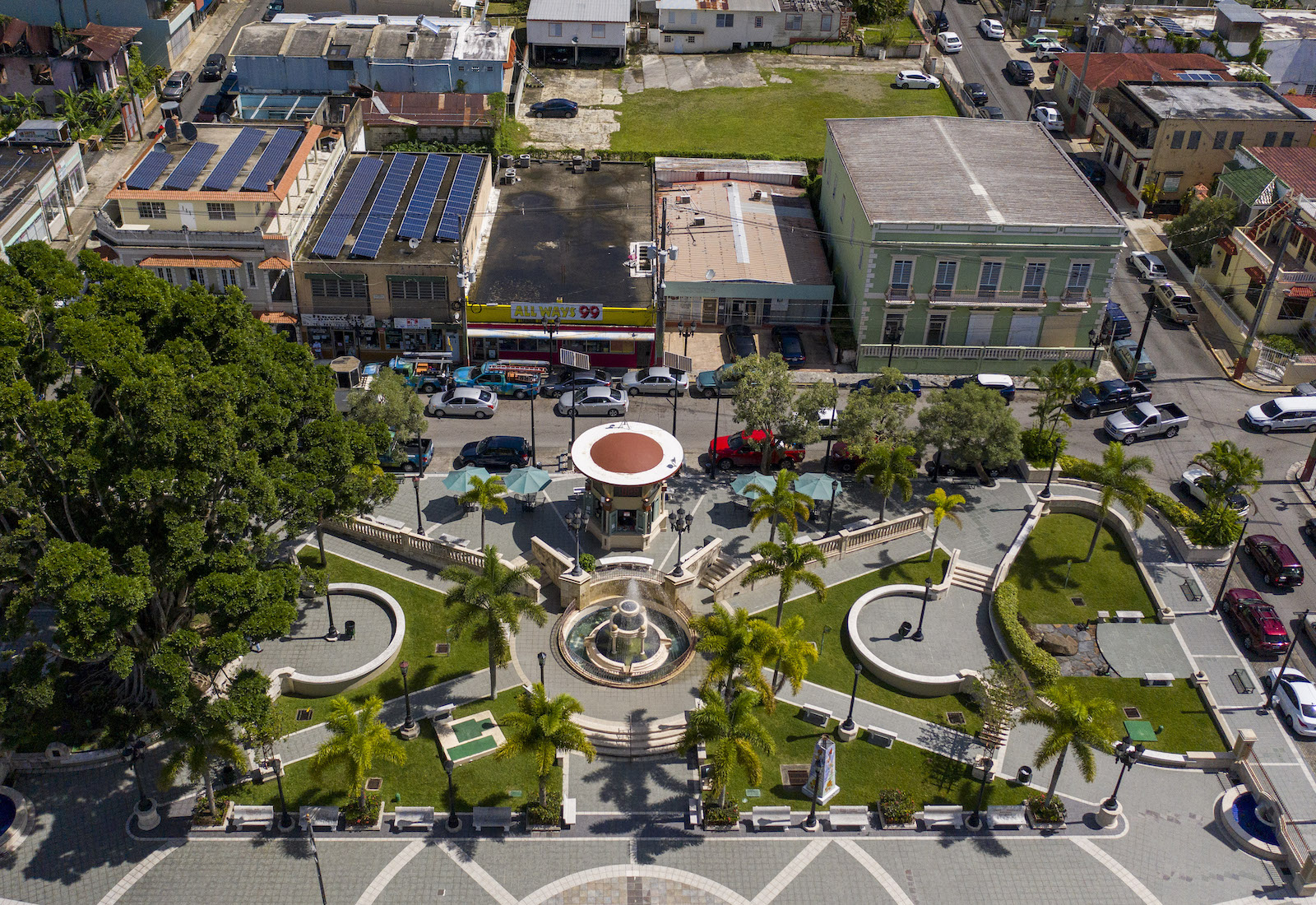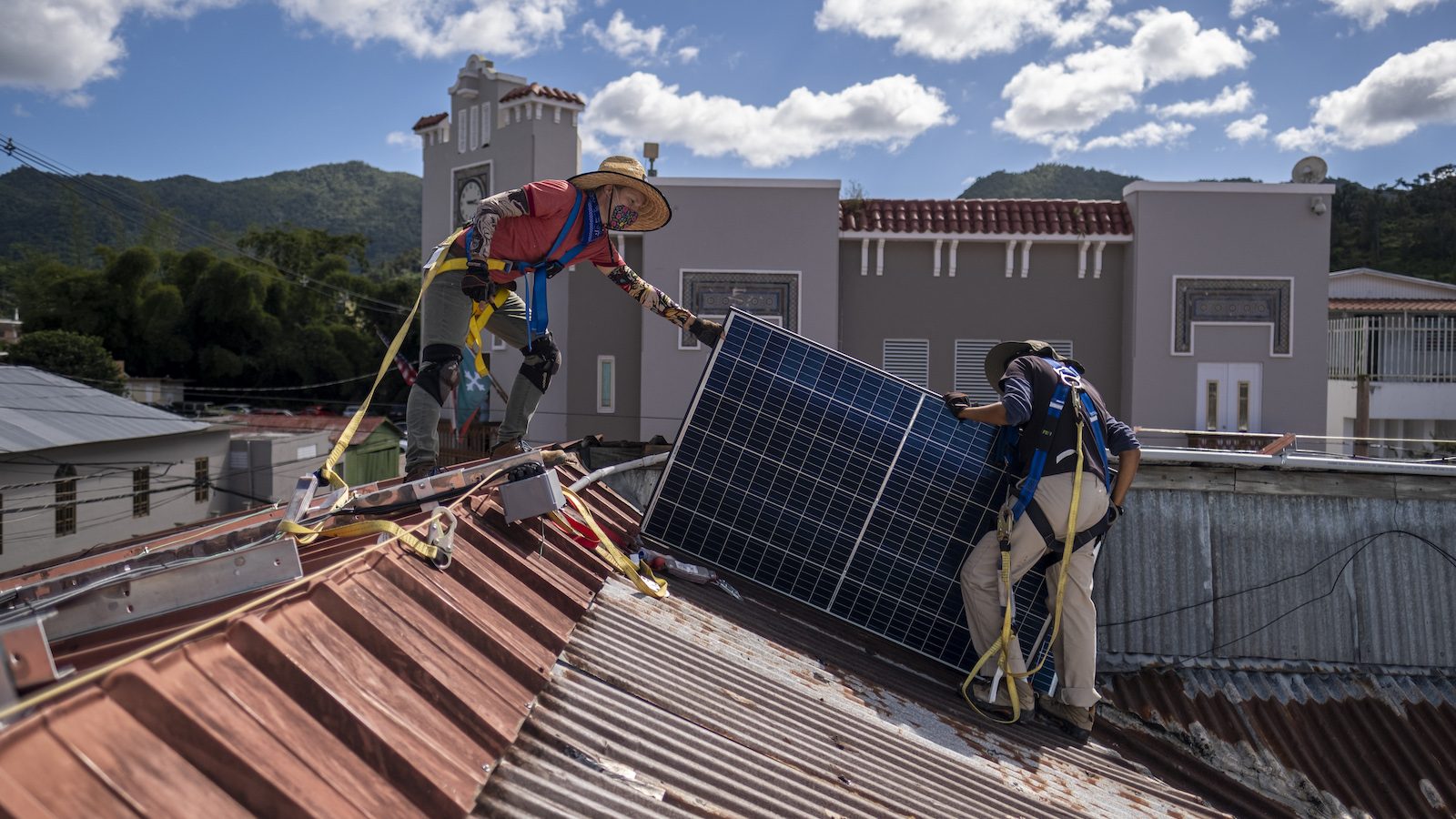Adjuntas, Puerto Rico, is celebrating a milestone this week as it completes the final phase in a project to boost its energy resiliency. The community’s 17,600 residents now host the archipelago’s first cooperatively managed solar microgrid — a network of photovoltaic panels and battery storage units that will use renewable energy to keep the lights on and power flowing during a power outage.
“This is a first-of-its-kind project,” said Kate Trujillo, deputy director of the nonprofit Honnold Foundation, which helped install the microgrid alongside the Adjuntas-based nonprofit Casa Pueblo. “It’s amazing to see it all coalescing.”
The system includes some 700 panels mounted on seven buildings in the town’s central plaza and a battery storage system capable of providing up to 187 kilowatts of power.* The batteries can provide enough off-grid electricity to keep 14 downtown businesses running for up to 10 days, serving as community hubs in case of an extended power outage.
Business owners and residents will run the microgrid through a nonprofit called the nonprofit Community Solar Energy Association of Adjuntas, which will sell electricity to the commonwealth’s grid through a power purchase agreement. Money saved by not buying power from Puerto Rico’s main power company will support maintaining the microgrid and starting new community projects, according to the Honnold Foundation.
The system was built in response to Puerto Rico’s increasingly severe hurricanes and the prolonged power outages they have caused for Adjuntas residents — some of whom have gone without electricity for as long as 11 months. Last fall, Hurricane Fiona destroyed half of Puerto Rico’s transmission lines and distribution infrastructure, knocking out power for hundreds of thousands of people. The damage came even as the archipelago’s power struggled to recover from similar destruction caused five years earlier by Hurricane Maria. Beyond the risk from extreme storms, Puerto Rico’s gas-fired power plants face ongoing risks from earthquakes.
As hurricanes and other climate-related natural disasters grow more destructive, many communities across the U.S. are turning to microgrids. One report published in 2021 said the cumulative capacity of such systems could more than triple by 2030, creating almost half a million jobs nationwide and billions of dollars in economic activity.

That’s not to say there aren’t still challenges. The Adjuntas microgrid has been in the works since 2019, as supporters needed time to raise funds for the system’s many components and figure out how to transport them up the mountain into town. Progress was further hamstrung by COVID-related supply chain disruptions, as well recurrent earthquakes and hurricanes.
“We’ve gone through a lot, … but we knew it was the right way to go,” said Arturo Massol-Deyá, Casa Pueblo’s executive director and a 2019 Grist 50 honoree. He also said it was difficult navigating a complex system of landlords, business owners, and other stakeholders to sort out how the microgrid would work and who would operate it.
Casa Pueblo used to own the only building in Adjuntas equipped with solar panels capable of meeting the community’s needs during an outage. Now, the microgrid will expand residents’ access to off-grid electricity, giving them the ability to refrigerate food and medicine, charge electronic devices, and more.
“It’ll do the kind of things that really help communities keep together during power outages and natural disasters,” Trujillo said. “It’s a beacon of light, both figuratively and literally, in times of need.”
Casa Pueblo and the Honnold Foundation will inaugurate the microgrid on Saturday with a community-wide celebration, including a festive “Marcha del Sol” through downtown. Massol-Deyá said he wants the event to make “a political statement” to get more of Puerto Rico off fossil fuels.
“What we are doing with the microgrid is a reference for what can and should be done in other municipalities in Puerto Rico,” he told me. “We can change our energy system, it can be done — we have shown that it can be done.”
*Correction: This article originally misrepresented the type of battery used in the microgrid’s battery storage system.



